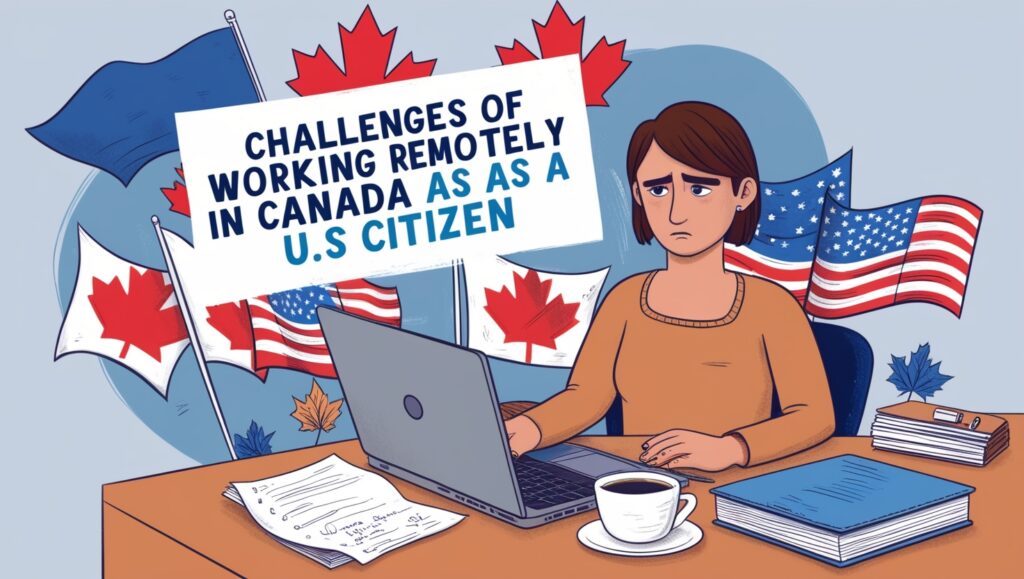Have you ever wondered if a US citizen works in Canada remotely? It’s exciting work-from-anywhere stuff—taking Zoom calls with a view of the Rockies or wrapping up your workday in a cosy Toronto café. Remote work has shattered geographical boundaries and opened up incredible opportunities. However, there are also questions of tax, legality, and compliance regarding working across borders.

In this guide, we’ll break it all down for you. Whether you want to spend a few months exploring Canada or planning a long-term remote work setup, this is your go-to resource.
Why More US Citizens Are Choosing to Work in Canada Remotely
Remote work allows US workers to discover new places without changing jobs. Canada is a particularly appealing destination for the following reasons:
- Flexibility with a Side of Adventure: This option allows you to absorb the breathtaking landscapes of Canada while keeping your job in the United States. You can experience the rigours of city life in Montreal or appreciate the quiet charm of Nova Scotia while still working.
- Cost of Living: Depending on where you stay, living in Canada can be cheaper than in major US cities. For example, housing in smaller Canadian towns may cost less than in tech hubs like San Francisco or New York City.
- Cultural Perks: Canada has something uniquely multifaceted: it’s as French-speaking Quebec as it is multicultural vibrancy like Toronto. You’ll have ample time during the work-from-remote season to enjoy all the local festivals, food, and traditions.
- Proximity to the US: Just on the other side of the border means you can easily travel back into the US when needed—perfect for visiting family or attending the occasional in-office meeting.
But before you start imagining yourself working in a café in Vancouver, let’s deal with the basics—legal requirements, taxes, and logistics.
Can US Citizens Legally Work in Canada Remotely?
The good news is that US citizens can usually work in Canada from anywhere, but not without some legal hoops to jump through:
Immigration Status
You usually need a work permit if you visit Canada while donating to a US-based company. Here’s what to know:
- Short-Term Stays: A visitor visa (valid for up to six months) may be enough to interact with Canadian clients or businesses.
- You are to spend more than six months. Then, you will be expected to get another type of visa to stay.
Work Permits
Working for a US company does not typically require a work permit for Canada because the money earned is not necessarily coming from Canada. Nevertheless, it may change once you are freelancing in Canada and working with a local business.
Consult an Expert
Immigration laws can be tricky and subject to change. If you’re unsure about your situation, consult an immigration lawyer specializing in cross-border work.
Taxes: What You Need to Know
Taxes are often the most complicated part of remote work across borders. Here’s a breakdown of the key points:
US Tax Obligations
As a US citizen, you must report your global income to the IRS, even if you are living abroad. This means you’ll still file your federal tax return as usual, including income earned while working in Canada.
Canadian Taxes
Canada’s taxation comes into effect if you live there for more than half the year.
- If you stay in Canada for over 183 days in one calendar year, you would likely be classified as a tax resident of Canada. This means that you would file a return for tax in Canada and might have to pay Canadian tax.
- A tax resident would be subject to taxation on their global income in Canada.
Double Taxation? Not So Much
Thanks to the US-Canada Tax Treaty, you do not pay double tax on the same earnings. Here is how you can go about it.
- You can claim a foreign tax credit on your US tax for any income taxes you pay in Canada.
- Analogously, Canada even provides a tax credit for US taxes paid without letting you get hit at both ends.
Cross-border tax laws are relatively complex, so hiring professionals knowledgeable of US and Canadian systems can be very helpful.

Setting Up for Remote Work in Canada
Working remotely is more than just packing your laptop and hitting the road. A little preparation goes a long way. Here’s what you need:
1. A Reliable Internet Connection
A stable, high-speed internet connection is essential for remote work-from-home, whether in a big city or a cabin up north. Canada has terrific internet coverage, but some preparation is required for rural areas.
2. VPN Services
You must protect your work and data through a virtual private network (VPN). This applies mainly when dealing with sensitive information or working from a public Wi-Fi.
3. Remote Work Tools
Stay organized and connected with tools like:
- Slack or Microsoft Teams for communication.
- Trello or Asana for project management.
- Zoom or Google Meet for virtual meetings.
4. Banking Solutions
If you’re earning in US dollars but living in Canada, you’ll need a convenient way to transfer money. To avoid costly exchange rates, look for low-fee options like Wise (formerly TransferWise).
Challenges of Working Remotely in Canada as a US Citizen
While remote work in Canada has plenty of perks, it’s not without its challenges.
1. Time Zones
If your employer is based on the West Coast and you’re working from Newfoundland, you’ll deal with a 4.5-hour time difference. Be prepared to adjust your schedule to align with your team’s working hours.
2. Healthcare
Public health insurance services are not extended to visiting Canadians. You require private health insurance in Canada to be safe in every medical case.
3. Legal and Tax Obligations
Trying to balance two nations’ laws and taxes becomes too daunting. The thing is that staying organized is highly recommended, as this, of course, involves lots of complexity.

Benefits of Working Remotely in Canada
Let’s not forget why working remotely in Canada is worth the effort. Here are some benefits to keep you motivated:
- Incredible Workspaces: Canada offers some of the most inspiring workplace places, whether it’s a chic café in Montreal or a peaceful lakeside retreat.
- Cultural Immersion: From exploring local markets to learning about Canada’s Indigenous heritage, you’ll gain experiences beyond work.
- Personal Growth: Living and working abroad helps you develop new skills, adaptability, and a global mindset—qualities that can boost your career.
Tips for US Citizens Planning to Work in Canada Remotely
- Talk to Experts: From immigration lawyers to tax consultants, expert advice will save you time and stress.
- Plan Your Finances: Before moving, understand currency conversion, banking fees, and tax implications.
- Track Your Stay: Record your days in Canada to ensure you comply with residency rules.
- Embrace Flexibility: Remote work often requires adjusting to new environments, time zones, and work routines.
Internal Opportunity for Turkish AI Training Jobs
Looking for other remote opportunities? Check out our blog on Turkish AI Training Jobs 2024 to explore another lucrative field for remote workers.
Conclusion
Working from Canada as a US citizen, I find it exciting to be able to blend work and adventure. Though it presents challenges, the knowledge of legal and tax implications, proper tools to be set up, and proper planning will help make remote work seamless.
You could be looking to spend some months exploring the beauty of Canada or considering a more extended stay. Now is the time to embrace the flexibility that remote work offers. Proper preparation will unlock new opportunities and create a work-life balance that suits you best.
Do you have questions or tips to share? Drop them in the comments below.


